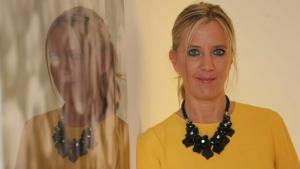Tatiana Stacul: "The super-powerful mother model is laughable and unfair"
Motherhood is a very important element in practically all human cultures that exist and have existed, but for that reason we have not managed to perceive and interpret it in a totally objective and realistic.
In fact, precisely because of its importance, the way in which we have conceptualized being a mother is subject to many biases. Culturally reproduced biases passed from one generation to the next... Although the way we do it is changing rapidly in recent decades.
In this interview We spoke with the psychologist Tatiana Stacul, a professional with experience in supporting people who have developed a problematic relationship with motherhood partly due to those social dynamics linked to gender roles.
- Related article: "5 examples of gender roles (and their effects on society)"
Interview with Tatiana Stacul: motherhood and deconstruction
Tatiana Stacul is a psychologist specialized in cognitive-behavioral orientation and trained in caring for people with gender-related problems; attends adults and adolescents in his office in Córdoba (Argentina) and online. In this interview she tells us about the way in which motherhood must be faced from sensitivities originating from feminism and perspectives linked to the deconstruction of roles of genre.
Why is it so difficult to have a realistic view of motherhood?
I think it is complicated because there are very few women who dare to talk about the costs that motherhood also brings.
A romantic vision of what the gestation process is and the state of supposed fullness of a mother is always repeated where the duty to be happy occupies the whole panorama, leaving everything aside what it means for a pregnant body to get pregnant, its transformation to an unknown body, hormonal upheavals, fears and new sexuality, difficulties, pains ...
If there is the possibility of planning it, surely we will suspend our careers, we will not compete for any job promotion, we will have to save, We will leave activities and all this should be taken with pride and a smile just because you decide to be a mother, because that role has many rules.
It is very difficult, there is no room for complaining, for repentance; because yes, many mothers regret it, and there are very few safe spaces where you can talk of this without falling on one the sentence of "bad mother", another construct that must be question.
What do you think are the social and cultural elements that favor mothers being subjected to pressure in the face of child-rearing work?
To define these elements it is necessary to understand a little where they come from. In the history of humanity, childbearing was glorified, regulated and needed for the constitution of societies. The woman had the role of caring for the elderly, raising and chores, because her motherhood confined her to the private sphere.
And it was in this area that she found her value: valuable to society as long as it deals with childhoods and childhoods. older, valuable to the man who chooses her as a mother and takes care of the home, And valuable as a woman as long as you are mother. For this reason, the idea of being a mother fosters an inherent pressure in the role, which is what it seeks to disarm.
The man, on the other hand, in charge of providing, was in the public sphere, being able to relate to more people, accessing various possibilities, handling money and being attended to when arriving at the home. We know this story, and the social and cultural ramifications that unfold over time are associated with these first roles, the passive and private woman and the active and public man.
And although feminist movements have managed to question this over and over again, achieving innumerable advances (the discussion on female sexuality, the right to vote, parental planning, contraceptives, decriminalization of voluntary termination of pregnancy, division of labor home, and many other discussions that did not exist before), we still continue to wonder and disarm these barriers that keep women pressed and cornered. women.
Another fundamentally cultural element is the internalized machismo in a large part of society, which explains and encourages many of the unequal situations at work, at home, in the home economy and caring for children kids.
When you talk about deconstructing ideas and ways of life from feminism, what are you talking about?
It has to do with dismantling ways of seeing and thinking about our reality, detecting the inequality marked by gender and asking ourselves how to change it... There is talk of understanding that these roles are determined by history, that they are assigned stereotypes, and this understanding opens up new questions for us.
And that is the fantastic thing about this, because it does not necessarily imply realizing that I do not do things at home and participate in the home, the deconstruction goes further. It is trying to understand why as a man I think that cleaning the kitchen is "helping" and not simply working in the place I live. It is asking myself why as a woman I think that I "should" dress in this or that way or have a certain hair removal habit.
It is asking ourselves where our knowledge comes from and how to make it something new, asking ourselves for example from what way we could raise our sons and daughters to feel free to express their emotions regardless of their gender. It is asking ourselves why toys are segmented and reflecting on how they affect childhood and their future.
To deconstruct from feminism is to enable a new look, whose objective is the rearming of a society constituted with beings that feel completely free for the simple fact of being people regardless of their genitality or orientation sexual.
How are psychotherapy and deconstruction processes related to gender roles?
If in psychotherapy the subject has an interest in deconstruction, my job as a therapist is to help him identify the mental rules that govern him, that make him ill and that are associated with this differentiation of roles. In what way do we hold ideas that are not our own, and based on that we build a life that we do not want, just to fulfill the role that I am supposed to assume.
Sometimes, the consultation begins on the one hand and inevitably ends in a deconstruction process, which ends up being a process liberating, because it is the client himself who can no longer balance his own desire and what is expected of him on a social level, and this generates anguish.
Mothers full of guilt come to the consultation for feeling that they regret having given birth, and nobody talks about that; people who punish themselves for enjoying their sexuality, men who only cry in consultation because out there the hostile world never enabled them to feel, and a long etcetera of situations where the damage of these roles and stereotypes that we carry for being born with this or that is evidenced organ.
Events such as the National Meeting of Women held annually in Argentina raise the need to meet to achieve social transformation. How to combine these resources that appeal to the collective, on the one hand, and resources such as psychotherapy aimed at individual patients, on the other?
The multinational meetings in Argentina are very strong deconstruction spaces. On those days thousands of women and feminities from different social classes meet in various workshops to talk about everything that is not talked about in everyday life: topics such as trans childhoods, wanted and unwanted maternity wards, women and mental health, women in prison, non-binary gender and dissidence, feminization of poverty, transsexuality and safe spaces, women and politics.
There are more than 100 annual workshops that are taught throughout the chosen city, and it is incredible, I think that what is built in those spaces is a rethinking of the culture we inhabit.
This validates and empowers women and contributes a lot to the individual spaces that are beginning to be created; social transformations favor the individual, and in the clinic this is reflected. The consultant, when he leaves therapy, faces the world again, and when the world is in transformation, it is easier to work on these changes and accompany the consultant in their own.
As a psychologist, what challenges would you highlight as the most important when creating an idea of motherhood that does not involve an unequal burden of responsibilities based on gender roles?
To give rise to a new idea of motherhood, it is necessary to question the one you have. I consider it a challenge to get a person who is a mother to speak without difficulty about their fears and thoughts related to her motherhood, so the first challenge to achieve the goal is make him understand that it is precisely in consultation where he will find a safe space without value judgments, to be able to express himself freely, understanding that everything he feels is valid.
"I can't stand my son", "I feel guilty for wanting him to sleep" "I don't know if I'm a good mother" or "I regret being a mother"... Many of the challenges that will come after expressing your fears and thoughts are linked to the stereotypes that We mentioned, with rigid constructs of what parenting is, and the need to respond to family pressures and own expectations.
By addressing these bases, we can gradually make our personal demands more flexible, recognize that the super-powerful mother model is laughable and unfair, that we must know how to ask for it. help, know how to set limits and negotiate a shared parenting as much as possible, and to create a more real and loving idea of what I consider about my own maternity.


